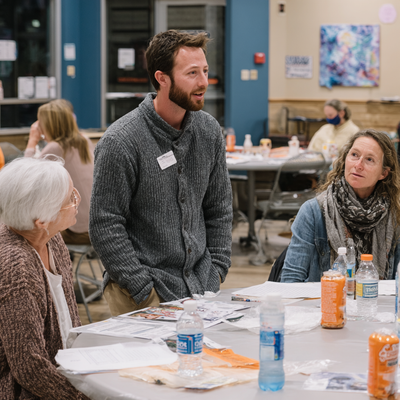Tom comes up to me after service all excited and goes "I have this amazing idea for VBS! What if we do full theatrical production with costumes and sets and choreography? I've been thinking about this for weeks!"
My heart just sinks because Tom's idea is actually really creative and he's so enthusiastic about it but we literally don't have budget or volunteers or time for anything that elaborate.
But he's standing there with this huge smile waiting for me to get as excited as he is and I'm thinking oh crap how do I crush this without crushing him?
Used to just panic and say yes to everything because I didn't want hurt anyone's feelings. Then spend next three months stressed out trying make impossible things work with resources we don't have.
Or I'd say something like "That's interesting we'll think about it" and then just hope they'd forget about it which obviously they never did.
Finally learned that saying no gracefully is actually way kinder than saying yes and setting everyone up for disaster.
But took me years figure out how to do it without making volunteers feel rejected or stupid.
The Sandwich Thing That Doesn't Work
You know that advice about sandwiching criticism between compliments? "Tom your idea is great but we can't do it however you're so creative!"
Sounds good in theory but what volunteers actually hear is just the middle part. The no part. Everything else sounds like you're just trying be nice.
Tom told me later he felt like I was patronizing him when I did that. Like I thought he was child who needed his feelings protected.
Way better to be honest about why something won't work instead of trying soften blow with fake positivity.
Starting with the Why
Instead of jumping straight to no I started explaining context first.
"Tom I love how creative you are and this idea shows how much you care about making VBS special. Here's what we're working with this year - budget of three hundred dollars, twelve volunteers, and two weeks to prep everything."
Then let them connect dots themselves about whether their idea fits those constraints.
Most of time they figure out on their own that elaborate theatrical production might not be realistic.
But sometimes they surprise you with ways to scale ideas down or find creative solutions you hadn't thought of.
Tom actually came back week later with simplified version his idea that worked perfectly within our limitations.
Offering Alternatives
When have to say no to specific idea try to say yes to person behind it.
"Tom your theatrical idea won't work for VBS but would you be interested in planning drama activities for regular Sunday classes? That might be perfect place for your creativity."
Shows you value their enthusiasm and skills even if timing or scope isn't right.
Mike wanted start Wednesday night program for middle schoolers but we didn't have capacity for that. Instead asked if he'd help with existing Sunday morning middle school class that needed fresh energy.
Sarah suggested elaborate craft project that would've cost fortune and taken hours prep. Asked if she'd help choose simpler crafts that kids could actually complete successfully.
Most volunteers just want contribute something meaningful. If you can redirect their energy toward something that actually works they're usually happy.
Being Honest About Capacity
Had to get comfortable saying things like "That sounds amazing but honestly we don't have bandwidth for that right now."
Or "I love your heart for this but adding another program would stretch our volunteers too thin."
Or "That's exactly the kind of creative thinking we need but our budget won't cover materials for something that elaborate."
Volunteers are adults. They can handle honest information about limitations.
Way better than pretending everything's possible and then having programs fail because we didn't have resources to support them properly.
The Future Option
Sometimes good ideas just have bad timing.
"Tom this theatrical idea is fantastic but maybe something we could work toward for next year when we have more time to plan and fundraise?"
Lets person know their idea has merit without committing to impossible timeline.
Then actually follow up about it later if circumstances change.
Had volunteer suggest community outreach event that was great idea but wrong time of year. Put it on calendar for next fall when it made more sense.
Shows you're taking their suggestions seriously even when can't act on them immediately.
When Ideas Don't Fit Ministry Direction
This one's harder because you're not just saying timing or resources are problem. You're saying idea itself doesn't align with what you're trying to accomplish.
Had volunteer suggest competition-based program that would've excluded kids who weren't good at sports or academics.
Instead of just saying no explained our goal is creating inclusive environment where every kid feels valued regardless their abilities.
Asked if they'd help brainstorm ways make activities challenging but still accessible to everyone.
Sometimes they get it and adjust their thinking. Sometimes they don't and that's okay too.
Protecting Volunteers from Themselves
Some volunteers have amazing hearts but terrible judgment about what's realistic.
Jessica wanted plan elaborate mother-daughter tea party that would've required renting venue, hiring caterer, and buying formal decorations.
For fifteen people.
Had to gently explain that simple potluck in fellowship hall would accomplish same goal of connecting moms and daughters without breaking budget or stressing everyone out.
She was little disappointed at first but admitted later she was relieved not to have plan something so complicated.
Sometimes saying no protects volunteers from taking on more than they can handle.
When Volunteers Get Upset
Not everyone takes no gracefully even when you explain reasoning clearly.
Had volunteer get really angry when I couldn't support their idea for expensive field trip that most families couldn't afford.
Accused me of not caring about kids' experiences and just being cheap and limiting.
Hurt but realized that volunteer was probably dealing with other stuff and my no was just last straw.
Gave them space to cool off then followed up week later to see if we could find compromise.
Sometimes people just need time process disappointment before they can hear alternatives.
Learning to Say No Early
Used to wait until volunteers had spent weeks planning something before telling them it wouldn't work.
Terrible approach because then they felt like they'd wasted time and effort.
Now I try catch unrealistic ideas early before people get too invested.
"That sounds interesting tell me more about what you're thinking" instead of immediately encouraging them to develop full plan.
Ask questions about timeline and budget and volunteer needs upfront.
Way easier to redirect energy early than to shut down something they've already put hours into.
The Creative Yes
Sometimes can't say yes to specific request but can say yes to underlying need or desire.
Volunteer wanted start whole new program for special needs kids but we didn't have trained volunteers or appropriate space.
Instead connected them with existing special needs ministry at larger church and offered to partner with them for some activities.
Met their heart for serving special needs families without taking on more than we could handle well.
Another volunteer wanted do missions trip with kids which was way outside our scope and budget.
Instead planned local service projects where kids could help community without travel costs or complicated logistics.
What I've Learned
Saying no kindly is actually more respectful than saying yes and setting people up for failure.
Volunteers appreciate honesty about limitations more than false encouragement.
Most volunteers just want contribute something meaningful and are flexible about specific methods.
Redirecting energy toward realistic alternatives usually works better than flat rejection.
Early conversations prevent bigger disappointments later.
People's reactions to no often have more to do with other stuff going on their lives than with your actual decision.
Why This Matters
Unrealistic expectations burn out volunteers faster than anything else.
Failed programs discourage everyone involved and make people hesitant try new things.
Clear boundaries actually create more freedom for creativity within realistic constraints.
Volunteers who understand limitations become better partners in problem solving.
Saying yes to everything means saying no to doing anything well.
Tom's Update
Remember Tom's elaborate VBS theatrical idea? After our conversation about constraints he came back with scaled down version using simple costumes kids could make themselves.
Turned out even better than original idea because kids were more invested in something they helped create.
Now he runs our drama activities during regular classes and kids absolutely love them.
Sometimes saying no opens door to something better than original idea.
That's what good no looks like. Not rejection but redirection toward something that actually works for everyone.








